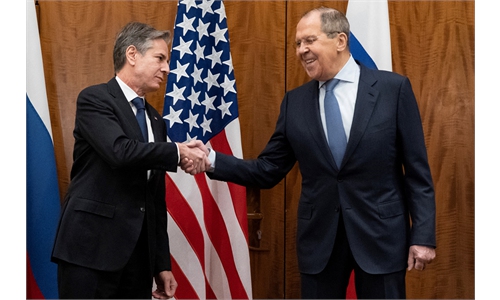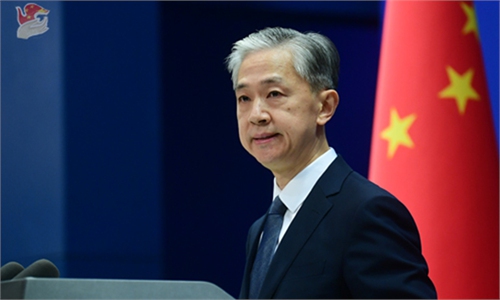Typical US scam: Hoaxing Ukraine into paying for ‘protection’: Global Times editorial

Russian Army Western Military District tank units wait to be loaded on a troop train on February 18, 2022, as they return from recent routine drills to permanent deployment sites in Novgorod. Russia announced a withdrawal of drill troops on February 15 amid the Ukraine crisis. Photo: VCG
The United Nations Security Council held a special meeting on the situation in Ukraine on Thursday, during which US Secretary of State Antony Blinken again quoted intelligence obtained by the US as claiming that Russia was preparing to launch an attack against Ukraine in the coming days. As February 16, previously cited as the invasion day, became a joke, some US media outlets proposed a new "invasion date" - February 20. It can be assumed that once that day passes, Americans will come up with a new guess. When it comes to a "war," the US has long launched one against Russia, a hybrid information war.
This time, Russia asked the council to discuss the Minsk agreements, yet the meeting was deviated by the US from the original theme with the hype of the "war." As a result, the real problem remains unresolved. The longer Russia and Ukraine are in a state of high tension, the more likely an eruption of that tension will be. From this perspective, the risk of an outbreak of war between the two exists and is constantly on the rise.
Blinken argued that the US shared the intelligence to prevent a war, rather than to start one. But the fact is quite the contrary. The fire was lit by the US, and the US has been stoking the fire. After the fire grows, the US made no attempt to end it, but jumped aside, accusing Russia of being the arsonist.
Looking back at the constant escalation of the Russia-Ukraine crisis, it is not hard to find out that almost all the information that pushed up the tension on their border came from "estimates from US intelligent agencies." And an absurd situation emerged in describing the crisis: Russia and Ukraine were denying fake news, but Washington, on the other side of the globe, was beating the drum and blowing the trumpet. The US used its powerful public opinion propaganda machine to cover the sound of the parties directly concerned, deliberately ignoring Ukraine's concerns, and forcibly speaking on behalf of Kiev.
People have every reason to suspect that Washington has produced so much "intelligence" just to boost NATO's power in Eastern Europe and seek to pave the way to satisfy its own unbridled strategic greed.
If Washington really wants to cool down the situation, it can just stop leading the NATO in hyping the tension eastward. But after all its efforts, the US did not weaken Russia as it wished. Instead, Ukraine, which the US claimed to "protect," has become the biggest victim: In fear of the outbreak of a war, panic has arisen in Ukraine and wealthy businessmen and officials have started to flee. Violent conflicts in eastern Ukraine have escalated, and the situation at the border is more volatile. But Washington doesn't care about Ukraine's stability or interests. What it wants is anxiety and chaos in Kiev.
The US has been very used to playing the tactics of fighting a public opinion and information war, and it is good at making conceptual shifts and reversing cause and effect. It frequently plays the trick of a thief crying "Stop thief!" From the Vietnam War to the Iraq War, then to the Syria War, US intelligence agencies have always been the invisible hand behind US hegemony, and the stories of its dark history are countless. They try to deceive the world with typical telemarketing scam tricks - concocting a scene, misleading the "victims" into making wrong judgments, and then asking them to pay for "protection." Washington has long been familiar with weaponizing fake news for its own political gain.
In recent years, Washington has become more obsessed with using false information for political gain. In order to shirk its responsibility, the US has let intelligence agencies be "in charge" of COVID-19 origins tracing. To smear other countries, the US has continued to fabricate lies under the guise of "human rights." To maintain its hegemony, the US has suppressed enterprises of other countries with various unwarranted reasons. However, as fake news grows, the anti-intellectualism it fosters has also backfired. Under the title of the world's No.1 disinformation country, US society has also become a victim of Washington's disinformation, and its domestic chaos and diplomatic hysteria are two sides of the same coin.
This reminds people of a famous saying: "You can fool all the people some of the time and some of the people all the time, but you cannot fool all the people all the time." Just let Washington politicians make up lies, and they will find out that by stubbornly digging holes for other countries, it is the US' own foundation that will eventually loosen.


